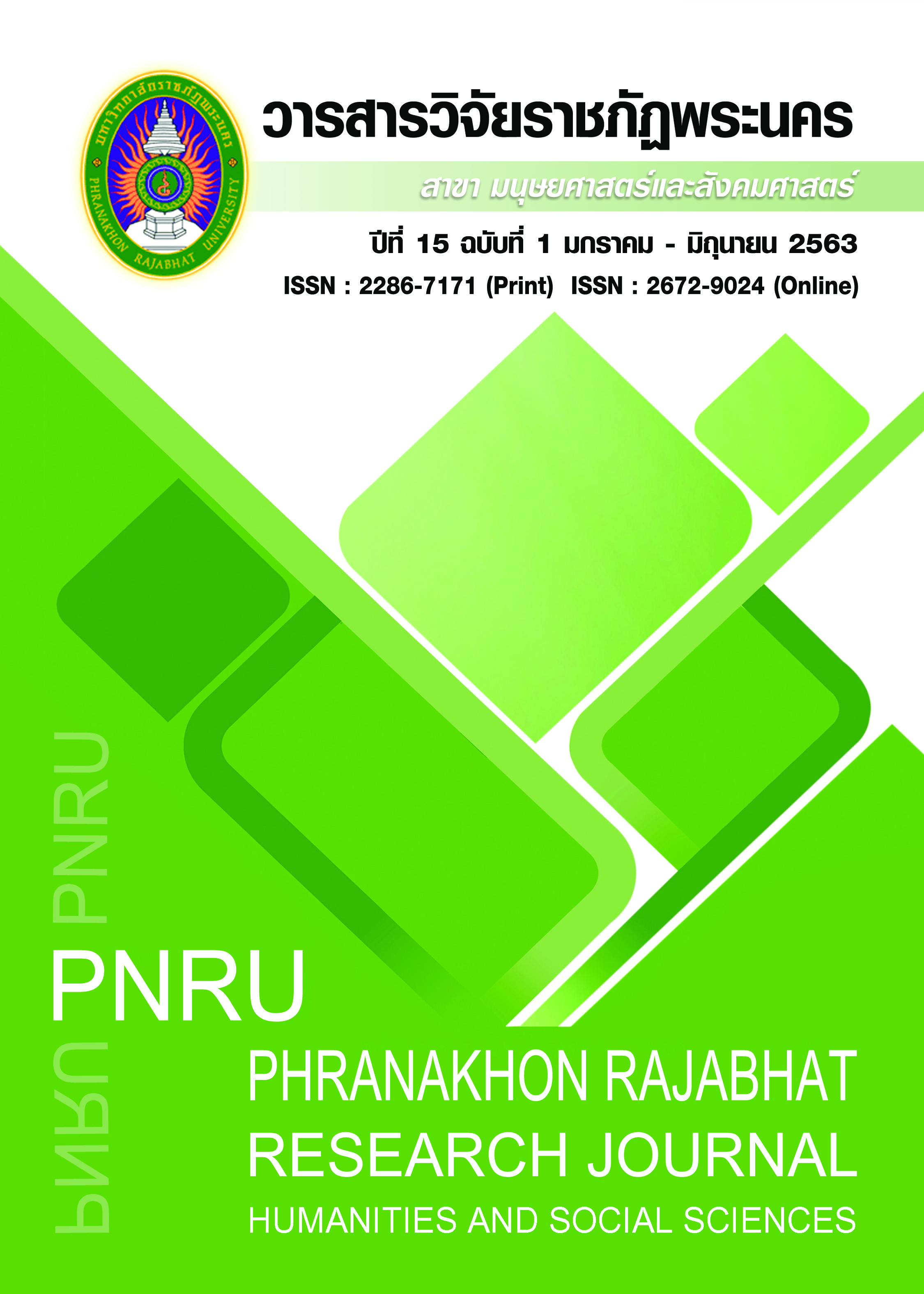DEVELOPMENT OF AUGMENTED REALITY MEDIA ON SOCIAL AND CULTURAL TOURISM: A CASE STUDY AT BANGKHEN, LAKSI, AND DONMUEANG DISTRICTS OF BANGKOK METROPOLIS
Main Article Content
Abstract
The purposes of this study were 1) to create an efficient Augmented Reality learning media (AR learning media) on social and cultural tourism for learning with expected criteria at 80/80 percent, 2) to examine the primary school students’ learning achievement, and 3) to evaluate students’ satisfaction toward the AR learning media. The samples were 30 Prathomsueksa-4 students selected by stratified random sampling from schools under the three districts, namely, Bangkhen, Laksi, and Donmueang of Bangkok Metropolis. Research tools consisted of 3 different types; 1) AR learning media on social and cultural tourism for learning, 2) achievement test, and 3) satisfaction survey form. Statistics for analyzing data were mean, efficient criteria for E1/E2 and t-test. The findings found that 1) the created AR learning media was efficient as expected criteria 80/80 percent, 2) students’ learning achievement after using AR learning media was significantly higher than before using AR learning media at .05 level, and 3) students’ satisfaction average scores were shown the expression at the highest level with 4.52.
Article Details
Each publish articles were copyright by Phranakorn Rajabhat University
Any contents which appeared in each articles in the journal were authors personal opinion. It did not relate to Phranakorn Rajabhat University and other instructors in the university. Each authors would take responsibility on their articles. If there are any mistake, the authors will take responsibility themselves
References
Binbai. S. (2017). Enhancing ICT Skills and Self-directed Learning Behaviors of Pre-Service Teachers through System of Flipped Classroom Blended Learning Approach. Electronic Journal of Open and Distance Innovative Learning. 9(1), 57-68. (in Thai)
Bunnapa, T., Chancharas, J., Buanagam, P., and Meekesorn, M. (2015). Learning media development through augmented technology on android system. In the 3rd ASEAN Undergraduate conference in Computing (AUC2). Retrieved 24 April, 2019, from http://aucc.csit.rru.ac.th/Upload/447-289-camera-ready.pdf. (in Thai).
Chakrod, K. (2017). Learning achievement in Mathematics on linear equation with on variable problem-solving for Mathayomsuksa 2 by using the guided discovery. Veridian E-Journal, Srinakharinwirot University. 5(1), 710-721. (in Thai).
Chailom, C. & others. (2019). The development of teaching materials AR technology systems by producing three-dimensional interactive media: The philosophy of sufficiency economy using AR technology on mobile. Retrieved 12 January, 2019, from http://branch.phraetc. itbaseth.com/11/public/source/16/AR.pdf. (in Thai).
Chareonroop, N. (2017). Applications of Augmented Reality to Present Tourist Information: A case study of Phrakaew Temple, Chiangrai Province, Thailand. Journal of Modern Management Science. 10(1), 13-30. (in Thai).
Chou, T.L., & Chanlin, L.J. (2012). Augmented reality smartphone environment orientationapplication: a case study of the Fu-Jen university mobile campus touring system. Procedia-Social and Behavioral Sciences. (46) 410-416. Retrieved January 22, 2019, from http://www.sciencedirect.com/science/article/pii/S187704281201261X
Iemkhoksung, P. (2013). The development of a smartphone application for tourist attractions recommendation. Master Thesis (Information Technology), Suranaree University of Technology.
Limpipattanakul, S., Wattana, J., Photisuwan, C. (2014). Learning activityy on palmistry for enhancing the self-directed learning readiness and the self-esteem of the retirees. Suthipatithat Journal. 28(88), 214-229. (in Thai).
Meesuwan, W. (2013). Augmented reality technology for learning. Education Journal, Naresuan University. 13(2), 1-9. (in Thai).
Maneenetr, T. (2009). Thai studies for tourism. Khonkaen: Khonkaen University. (in Thai).
Nuanlaong, R., Preechadirek, N. (2015). Applying 3D digital learning-based game for improving students English language skills in accordance with multiple intelligence theory via tablet devices. ICT Silpakorn Journal. 2(1), 11-27. (in Thai).
Pariyawatid, P. (2015). Effecting augmented reality code of Chinese vocabularies lesson for Grade 3 students at Tessaban 2 Wattaninarasamosorn school. Master Thesis (Educational Technology and Communications), Prince of Songkla University. (in Thai).
Riyaphun, H. (2019). Multimedia for instruction and distance training. Retrieved 22 February, 2019, from https://www.stou.ac.th/offices/Oce/publication/pr3/pr%20117561.pdf. (in Thai).
Silva. R., Oliveira. J. C., & Giraldi. G. A. (2019). Introduction to Augmented Reality. Retrieved July 10, 2019, from (ncc.br/~jauvane/papers/RelatorioTecnicoLNCC-2503.pdf
Sriphromting, N., and Saelee, A. (2014). Kingdom of Virtual Animal. Udon Thani: Udon Thani Rajabhat University. (in Thai).
Songkram, N. (2010). Multimedia for learning: design & development. Bangkok: Chulalongkorn University. (in Thai).


